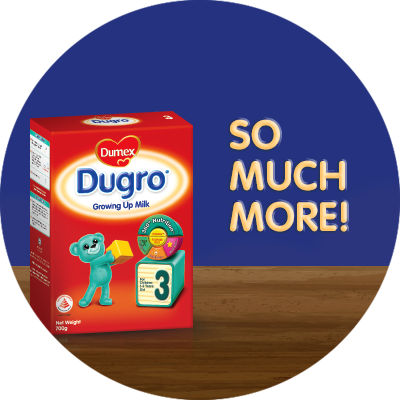Breastfeeding is the best for babies and a healthy diet / maternal nutrition is important when breastfeeding. A decision not to breastfeed can be difficult to reverse. Infant formula is suitable from birth when babies are not breastfed. It is recommended that all formula milks be used on the advice of a doctor, midwife, health visitor, public health nurse, dietitian, pharmacist, or other professional responsible for maternal and child care and the financial implications should be considered. All preparation and feeding instructions should be followed carefully as inappropriate preparation could lead to health hazards.
Nutrition Basics: Understanding the First 1000 Days of Life

The first 1000 days from conception up until the age of 2, is a critical period that shapes a child’s development and growth. Research into this field called nutritional programming shows how good nutrition during early pregnancy up to childhood will affect your child’s health later in life.
While nutrition, in particular, is central to a child’s development, studies have found that a child’s relationships and environments also shape future outcomes1. These outcomes are not just limited to physical growth but also affects a child’s ability to learn and prosper throughout their life. This is why the first 1000 days of life is considered a “golden opportunity” that could make a huge difference in your child’s future.
1. Pregnancy
During pregnancy, a developing baby’s only source of nutrition comes from their mother. A healthy diet with the right nutrients benefits your child’s future health. This is because nutrients affect the formation of new neurons and synapses that control vital neurodevelopmental processes, as well as the development of cardiovascular and musculoskeletal systems, metabolism, organs and more2.
Nutrients that play a crucial role in growth and development during pregnancy include the following:
- Iron: Plays a role in the development of nerve fibres2
- Zinc: Supports development of the autonomic nervous system, the hippocampus and the cerebellum2
- Iodine: Important for cognitive and motor development3
- Folate: Vital for brain and spine development; Helps prevent neural defects such as anencephaly and spina bifida4
- Copper: Helps in the development of the heart, blood vessels, as well as skeletal and nervous systems5
- Long-chain polyunsaturated fatty acids: Plays an essential role in healthy brain and eyes development2
A healthy and nutrient-rich diet is not the only thing that’s important. Research has shown that a mother’s physical and mental health also has an impact on child development during pregnancy2. This is why having a support group and a nurturing community is important for mothers.
2. Early Childhood
Meeting nutritional requirements should continue up to early childhood. As a child’s brain is developing at a rapid rate, the right nutrition is needed to support this development.
Essential nutrients for a toddler’s developing brain include essential proteins as well as:
- Iron plays a role in the brain’s neurochemistry6 7
- Zinc contributes to brain structure and function8
- Iodine is vital for brain development9
A balanced diet for a growing child should include a variety of foods such as proteins, whole grains, dairy, vegetables and fruits10. Healthy eating habits should be promoted from a young age and nutrient-poor foods that are high in sugar, fat or salt should be avoided. By nurturing and nourishing your child with the right nutrients, it helps them reach their full developmental potential.
3. Childhood
While the first 1000 days are the most critical in a child’s development, feeding your child a balanced diet with essential nutrients should still continue beyond that. Building good eating habits and encouraging a healthy lifestyle for your child builds a strong lifelong foundation for them.
Dumex Mamil Gold Stage 3 offers stage-tailored nutrition for children aged 1-3 years old. It supports healthy growth and development with a blend of 30 essential nutrients tailored to each stage of childhood.
Dumex Mamil Gold offers a naturally-sourced formula produced from free-roaming grass-fed cows. Free from genetically modified organisms (GMOs), colourings and added sucrose. With a unique prebiotic blend of galacto-oligosaccharides (GOS) and long chain fructo-oligosaccharides (lcFOS) in a 9 to 1 ratio, it supports good gut health and helps build your child’s natural defences.11
Visit https://www.dumex.com.sg/products for more information on Dumex Mamil Gold.
1. 1,000 Days. (2020). Why 1,000 Days - 1,000 Days. Retrieved July 6, 2020, from https://thousanddays.org/why-1000-days/
2. Georgieff M.K., Rao R. & Fuglestad A.J. (1999). The role of nutrition in cognitive development. In: Handbook of Developmental Cognitive Neuroscience (editors Nelson, C.A, Luciana, M.). Cambridge, MA: MIT Press; p. 491-504
3. Is it true that lack of iodine really causes brain damage? (2019). Retrieved July 6, 2020, from https://www.who.int/news-room/q-a-detail/is-it-true-that-lack-of-iodine-really-causes-brain-damage
4. Williams, J. et al. (2015). Updated Estimates of Neural Tube Defects Prevented by Mandatory Folic Acid Fortification in the United States 1995 – 2011. Morbidity and Mortality Weekly Report. 64(01);1-5.
5. Copper in your pregnancy diet. (2015). Retrieved July 7, 2020, from https://www.babycenter.com/0_copper-in-your-pregnancy-diet_677.bc
6. Wachs, T.D., Georgieff, M., Cusick, S. & McEwen, B.S. (2013). Issues in the timing of early interventions: contributions from nutrition, neuroscience, and psychological research, Annals of the New York Academy of Sciences, 1308:89-106.
7. Beard, J.L. & J.R. Connor. (2003). Iron Status and Neural Functioning, Annual Review of Nutrition, 23: 41-58.
8. Black, M. M. (1998). Zinc deficiency and child development. The American journal of clinical nutrition, 68(2), 464S-469S.
9. Schwarzenberg, S. J., & Georgieff, M. K. (2018). Advocacy for improving nutrition in the first 1000 days to support childhood development and adult health. Pediatrics, 141(2), e20173716.
10. Fewtrell, M., Bronsky, J., Campoy, C., Domellöf, M., Embleton, N., Mis, N. F., ... & Molgaard, C. (2017). Complementary feeding: a position paper by the European Society for Paediatric Gastroenterology, Hepatology, and Nutrition (ESPGHAN) Committee on Nutrition. Journal of pediatric gastroenterology and nutrition, 64(1), 119-132.
11. Arslanoglu et al (2008) J.Nutr 138.1091-5

Ask Our Careline
Whatever’s on your mind, we’re here to help




